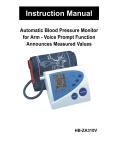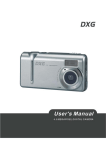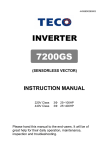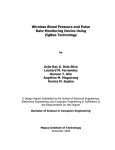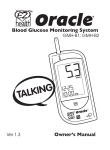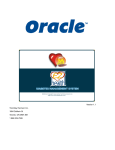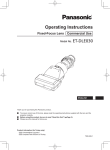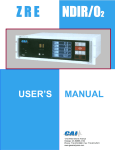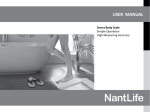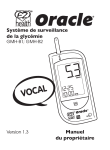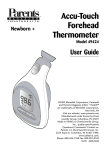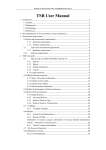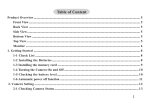Download Instruction Manual
Transcript
Owner’s Manual EZ HealthTM Platinum Series Talking Automatic Blood Pressure Monitor ABP-B1 Contents Introduction..…………………………………………….… 3 Warning Signs/Safety Statements ……………………… 3 Health and Blood Pressure Values …………………….. 4 What is Blood Pressure …………………………………. 4 Important Information ……………………………………. 6 Precautions ………………………………………………. 6 Contraindications ………………………………….. 7 Warning …………………………………………………… 8 Suggestions before Measuring Blood Pressure ……… 8 Device Descriptions ……………………………………… 9 Description of Control Buttons …………………………. 10 Description of LCD Display Symbols ………………….. 10 Using Adapter or Installing/Replacing Batteries …………11 Voice Prompt Function……………………………………. 13 Set the Language of Voice Prompt ……………………. 13 Program Date and Time ...……………………..………… 14 How to Apply the Arm Cuff ………….…………………… 15 Correct Measurement Position ………….……………….. 16 How to Take A Measurement ……………………………. 17 How to Use the Memory Features ……………………… 19 How to Delete Single or All Memories ……………….…. 20 Maintenance ……………………………………………….. 21 Error Message and Troubleshooting ……………………. 22 Specifications ……………………………………………… 26 Warranty Information ……………………………………… 27 Personal Blood Pressure Record ……………………… 28 2 Introduction TM Thank you for purchasing the EZ Health Platinum Series Talking Automatic Blood Pressure Monitor model number ABP-B1. For your safety, please be sure to read this Owner’s Manual thoroughly before using the Blood Pressure Monitor. For other specific information about your own blood pressure, CONTACT YOUR PHYSICIAN. z Measures Blood Pressure (SYS. & DIA.) & Pulse. z Fuzzy logic measurement system with fully automatic inflation and deflation to provide home blood pressure monitoring convenience. z Voice prompt announces blood pressure and pulse measurements. z 80 sets of memory with Date/Time z Easy wrap regular arm cuff suitable for arm sizes from 22-32 cm (8.7” to 12.6”)., z Easy wrap large arm cuff suitable for arm sizes 32-42 cm (12.6”-16.5”). z Automatically turns off after 1 minute. z Low Battery icon and intelligent error detection. z Operates on four “AA” alkaline batteries or AC adapter. z Recall and Scan functions. z Delete single or all measurements. z Blue backlight LCD display. z 3 colour LED lights to indicate Normal (green), Higher (yellow) or Abnormal High (reddish) blood pressure. Warning Signs & Safety Statements *ATTENTION!! Read user’s manual before use. *Type BF applied part *Double insulated 3 Health and Blood Pressure Values Because of continuous aging of blood vessels, blood pressure of the human body tends to naturally increase from middle age onwards. Further causes for increased blood pressure include obesity, lack of exercise, cholesterol (LDL) adherence to blood vessels causing the vessels lose their elasticity and a variety of other medical problems. Higher blood pressure accelerates hardening of the arteries, making the body more susceptible to coronary heart disease and strokes. Blood pressure fluctuates constantly throughout our daily life and is an essential element for our daily health management. We follow routine blood pressure trends in order to optimize health. What is Blood Pressure Blood is pumped through your arteries by the beating (contraction and expansion) of your heart. The pressure of the pumped-out blood is called the “blood pressure”. Blood pressure elevates with each beat of the heart. The pressure when the heart contracts is called the “systolic blood pressure” and the pressure when the heart relaxes is called the “diastolic pressure”. Systolic pressure is always higher than diastolic pressure. Blood pressure is typically low in the morning and increases from the afternoon to the evening. It is lower in the summer and higher in the winter. Blood pressure naturally varies from time to time throughout the day. Many factors that may cause the blood pressure to fluctuate include: Breathing, Exercise, Mental stress, Smoking, Eating, Concern, Environmental and/or temperature change, Time of day, Urination and bowel movements, Conversation, Bathing, Drinking alcohol, Medication and Physical activity. 4 z Variations in Blood Pressure: Variations in blood pressure over a whole day with measurement taken every five minutes as shown below. z Classification of Blood Pressure by the WHO: The World Health Organization (WHO) and the Inter-national Society of Hypertension (ISH) developed the Blood Pressure Classification shown as below. 5 Important Information z Blood pressure values measured at home tend to be lower than those measured in the hospital or physicians offices. This is called “White Coat Syndrome” and is caused by the fact that you tend to be nervous when you have your blood pressure measured in the hospital, but you feel relaxed at home. It is important to know your stable normal blood pressure measured at home. z It is recommended for persons who have heart trouble, kidney trouble, hypertension, diabetes, arteriosclerosis or other problems related to the circulatory system, consult your physician to ensure that the blood pressure monitor is being used properly so that blood pressure monitor accurately reflects your actual blood pressure. z Blood pressure can fluctuate by 30 to 50 mmHg without being noticed. These changes can be influenced by whether you are nervous or relaxed, exercise or the environment (temperature or mental state). z The device may show some reading errors in the presence of common arrhythmia such as arterial or ventricular premature beats or atrial fibrillation. Precautions z This unit will not serve as a cure for any symptoms of cardiovascular disease or other diseases. The data measured is only for reference. Always consult your physician if any abnormal results are measured. z Always follow the operation procedures described in the manual to ensure that you measure your correct blood pressure. z Be sure to store this manual for future reference. 6 z Diseases such as diabetes and hyperlipidemia accelerate hardening of the arteries. If such conditions continue, there is an increased danger of stroke, coronary infarction, arterial stenosis and disorders of the peripheral blood circulation. In such cases, there can be a large difference between blood pressure values taken at the wrist and upper arm. (Since even healthy persons may show a difference of 20 mmHg if the conditions of the measurement status are not suitable. Do not rely on the self-diagnosis or just one measurement, and always follow the advice of a physician.) Physiological conditions may have varying degrees of effect, but generally blood pressure values at the wrist and upper arm should display the same pattern of change. Consequently, it is possible to monitor trends in change by measuring blood pressure at the wrist and upper arm. Contraindications z Do not use the device on infants or persons who cannot communicate. z Do not use the device for purposes other than measuring blood pressure. z Do not use this device near any mobile phone or microwave oven in use, or reading error may occur. z Do not try to disassemble or modify the unit or cuff, which may damage the unit or cause permanent reading error. z Do not start the inflation when the arm cuff is not wrapped around the arm. z Do not drop this unit and avoid subjecting the device to a strong impact. 7 Warning z If the inflation continues and doesn’t stop, please open the cuff immediately or turn off the unit by pressing the POWER button. z Do not measure repeatedly for a long period of time. z This device is not supposed to be used if your arm has any wound or injury. z Remove batteries if not using the device for a long time. z Do not use batteries of different types or brands for this may lead to an incorrect reading and possibly cause battery explosion (for example mixing using alkaline and heavy duty batteries). z Leaving the batteries in the blood pressure monitor for over 3 months and not using the device may damage the device by battery leakage. Please read the Installing/Replacing Batteries section in this manual. z The device might not meet its normal performance if stored or used beyond the temperature and humidity ranges specified below. Operating conditions: 10℃~40℃, 40%~85% R.H. Conditions for storage: -20℃~50℃, 15%~85% R.H. Suggestions before Measuring Blood Pressure 1. Please relax yourself physically and mentally for at least 5-10 minutes before measurement. 2. Avoid eating, smoking, exercising, bathing and drinking (alcohol/coffee/tea) for at least 20-30 minutes before measuring your blood pressure. 3. Be sure the cuff is at the same level as your heart. 4. Stress raises blood pressure. Keep calm and relax during measurement. 5. Please DO NOT talk or speak during measurement. 8 6. Avoid urination or bowel movement before taking a measurement. 7. Wait at least 5 minutes before you take another blood pressure measurement. 8. Keep the records for your physician as reference. 9. Remember that a single measurement is not necessarily representative of your typical blood pressure. Recording multiple measurements over time will reveal the long-term trend of your blood pressure. Try to measure your blood pressure at the same time each day for consistency. Device Descriptions Adppter photo changed 9 Description of Control Buttons z POWER: To turn on or turn off the unit z START: To start inflating cuff to measure blood pressure and pulse. To set the language of voice prompt or voice on/off. z TIME: To set the Date/Time. z MEMO/▲: To review the measured record(s). To select the digit of the Date/Time. z SCAN/▼: To automatically review all previously measured record(s) from memory list. To select the digit of Date/Time / To delete memorized record(s). Description of LCD Display Symbols 10 Using Adapter or Installing/Replacing Batteries You can use the unit by using the Adapter or Batteries. Be sure the unit is turned off before installing/replacing batteries, or the memories & Date/Time setting will be erased. If the batteries are removed or the adapter unplugged for more than 30 seconds, the memories and the Date/Time setting will be erased. Then, you must reset the Date/Time. z Using Adapter Plug the supplied AC adapter cord into the power jack located on the backside of the unit. Plug the AC adapter into a standard 120 V wall outlet. The unit is ready to use. Note: Please use the AC adapter enclosed with the product only. (Input: 120V, Output: 6VDC 500mA, ) z Installing/Replacing Batteries 1. Slide the battery compartment to remove it. 2. Place the batteries (4 “AA” Alkaline batteries) in the 11 compartment as indicated by the polarity symbols (+ and -) marked inside. All the display symbols appear for 1 seconds and then return to standby mode. 3. Replace the battery compartment cover. Note: When (Low Battery indicator) appears on the display, the batteries are weak. Change the batteries as soon as possible, or it may not be able to take any measurement and the memories and the Date/Time setting of the unit may be lost. Warning: a. Be sure to follow the instructions above when plugging the adapter and installing or replacing the batteries. b. We recommend you to use ALKALINE batteries for the best performance and the longest device life. c. Use only brand new batteries of the required size and DO NOT mix using old and new or different type of batteries together. d. Remove the batteries if not using the blood pressure monitor for an extended period (i.e., 3 months). The batteries can leak chemicals and damage the electronic parts. e. Immediately replace drained batteries with new ones. f. Check the batteries periodically and replace them when necessary. g. When using the adapter alone without battery, the 12 memories and the Date/Time setting won’t be saved during a power failure. Voice Prompt Function When first plugging the adapter or installing the battery, the initial mode is voice prompt mode. While starting the unit and operating each time, there is a voice prompt to remind you. It’s especially useful for the visually impaired. You can turn off this function if you don’t want to hear any reminder. Set the Language of Voice Prompt There are four languages of voice prompt English, Deutsche (German), French, Español (Spanish) that can be set. Make sure you have turned off the unit before you want to set the voice prompt function. 1. Press START button, the unit will show “Eng 1” (default) and speak a demo voice in English “Memory number 3, Systolic pressure 160 high, Diastolic pressure 66 normal, Pulse rate 62” 2. Press MEMO/▲ button or SCAN/▼ button to set the number representing the language. 3. Press START button to confirm and the unit will show “UoC On” (default) 4. Press MEMO/▲ button or SCAN/▼ button to set the voice prompt on or off. 5. Press START button to confirm and the unit will go to standby mode 13 Note: When using Voice Prompt Function, it increases the power consumption and reduces battery life. Program Date and Time 1. Press and hold TIME button for 2 seconds until “2006” shown on the screen and starts to flash. 2. Press MEMO/▲ button or SCAN/▼ button to set the number representing the Year. 3. You can press and hold MEMO/▲ or SCAN/▼ buttons for about 2 seconds, the number of the Year will be displayed in the faster speed. 14 4. Press TIME button to confirm the Year setting. Then the number representing the Date will flash. 5. In the same manner, set the Month, Date, Hour and Minute. Note: After replacing batteries, always check to make sure the Date/Time is properly set before using the blood pressure monitor. If the batteries are removed for more than 30 seconds, you must reset the Date/Time. How to Apply the Arm Cuff 1. Insert the air plug of the arm cuff into the air jack of the blood pressure monitor. 2. The cuff should be assembled correctly when it is removed from the box. If it is not, pass the end of the cuff furthest from the tubing through the metal D-ring to form a loop. The smooth cloth should be on the inside of the cuff loop. 3. If the cuff is assembled correctly, the sewn hook material will be on the outside of the cuff loop and the metal D-ring will not touch your skin. 4. Put your left arm through the cuff loop. The bottom of the cuff should be approximately 1/2” above the elbow. 15 The cuff tubing should be positioned along the middle of the inside of your arm as shown. 5. Pull the cuff so that the top and bottom edges are tightened evenly around your arm. 6. When the cuff is positioned correctly, press the sewn hook material firmly against the pile side of the cuff. 7. The cuff should be wrapped so that it fits snugly and stays in place. You should be able to fit one finger between the cuff and your arm. Correct Measurement Position In order to ensure accurate readings it is extremely 16 important that the cuff is at the same level as your heart. Higher or lower positions will give deviations from the true value. Measurement while sitting down 1. Sit in a chair with your feet flat on the floor and rest your arm on a table so that the cuff is at the same level as your heart. 2. Relax your arm and turn your palm upward. 3. Make sure there are no kinks in the air tubing. 4. After taking deep breaths several times before measurement, take a natural breath, and then relax your body. How to Take A Measurement Please read and follow directions in the section “Suggestions before Measuring Blood Pressure” and “How to Apply the Arm Cuff” before taking a measurement. 1. Press POWER button to turn on the unit. All the symbols displayed for a couple seconds then the number 0. The unit says “measurement ready” 2. Press START button, the cuff automatically inflates to approximately 170mmHg. (50mmHg higher than the average systolic blood pressure reading.) 3. When the cuff reaches your correct inflation level, it 17 begins to deflate automatically with decreasing numbers shown on the display. The Heart Symbol flashes as the onset of oscillation signals. * If during deflation the blood pressure monitor senses that higher pressure is required to measure the user’s blood pressure, the device will stop deflation and pump again to reach the workable pressure (up to the max. 280 mmHg). If the inflation continues and doesn’t stop, please unwrap the cuff immediately or turn off the unit by pressing the POWER. 4. The monitor exhausts the residual air when the measurement is completed. The Heart Symbol stops flashing and your blood pressure and pulse will appear on the display. In the mean time, the unit announces the measured value of Systolic, Diastolic and Pulse twice. After taking the measurement, the most recent measured readings will always be displayed before the power is turned off. Note: z Wait for at least 5 minutes if you want to take another measurement. Waiting allows your blood vessels to return to normal status. More rest time may be required between measurements depending on individual physiological conditions. z While starting the unit each time, it will give a voice 18 prompt “measurement ready”. If you don’t need it, please turn off the announcement. How to Use the Memory Features The blood pressure and pulse measured and displayed are automatically stored in the memory. The blood pressure monitor can store up to 80 measurements. If more than 80 measurements have been taken, the earliest measurement will be erased and replaced by the most recent measurement. 1. Review the Average Value and previous measurements: Press MEMO/▲ button, the unit first displays the average values of Systolic, Diastolic and Pulse with voice prompt. (Averaged from all memorized readings.) Press MEMO/▲ button again to review the measurement from the most recent to the earliest with voice prompt. The most recent measurement (M 01) appears when you press MEMO/▲ button. M 01 is the most recent reading measured. The Systolic, Diastolic, Pulse and Date/Time of the measurement will be displayed. Press MEMO/▲ button to repeatedly review other memorized readings. The readings will be displayed as M 02, M 03, M 04 … etc. You can press SCAN/▼ button to switch to the automatic display mode. 2. Scan all previous measurements: Press SCAN/▼button, the unit will display all measurements one by one in one in one second intervals. In the automatic display mode, it doesn’t have voice prompt function. You can press MEMO/▲ button 19 to switch to the single display mode. 3. The 3 colour LED warning lights: It will indicate the status of each blood pressure measurement is Normal (green), Higher (yellow) or Abnormal High (reddish). How to delete Single or All Memories 1. Delete single measurement: You can delete a single memory just after taking the measurement. Press SCAN/▼ button then “dEL” will appear and flash and says “delete”. Press SCAN/▼ button again to confirm the delete function. 2. Delete all measurements: Turn off the unit first then press and hold SCAN/▼ button until “dEL ALL” displayed and says “delete all”. Press SCAN/▼ button again and all memories will be deleted when “00 ALL” shown on the screen and says “deleted”. 20 Maintenance Storage 1. Always use the storage box provided with the device to transport or store the unit. 2. If you will not use the device for an extended period (over 3 months), remove the batteries. 3. Do not store the device in direct sunlight, high temperatures, humid, dusty, or corrosive environment. 4. Do not stretch, bend or tug on the hose or cuff. 5. Do not immerse the unit in water. Cleaning 1. Do not use an alcoholic-base, benzene, gasoline or solvent agent to clean the device. 2. Wipe with a moistened cloth with clean water or a mild cleaning agent and then dry the device with a soft and dry cloth. 3. The dirt on the cuff can be wiped with the moistened cloth and soap. 4. Do not rinse the device or cuff. 5. Do not bend the cuff or sleeve or attempt to turn the sleeve inside-out. 6. Do not disassemble the device or dismantle the cuff or try to repair yourself. If any problem occurs, bring the monitor to your distributor for further assistance. 7. Do not operate the device in severe environments, extreme temperature or humidity, or direct sunshine. 21 Error Message & Troubleshooting The unit is manufactured using a complete quality assurance system. If the measurement is not made correctly, the following errors will be displayed. Measure your blood pressure again using the appropriate corrective action. ERROR MESSAGE Error Indicators Cause zIncorrect posture in measurement or the user moves or talks during measurement. zThere is artificial interference or noise during measurement. zUser is tense and does not relax or has severe heart beat irregularity or arrhythmia. 22 How to correct zCuff is not fastened well; please fasten again following the instructions. zWait at least 5 minutes before taking another measurement. Repeat steps listed under “How to Take a Measurement.” zUser has special characteristic, please refer to a physician. Error Indicators Cause How to correct zNo pulse or blood zCuff is not fastened pressure sensed. correctly or not tight zIncorrect posture enough; please during fasten the cuff by measurement. following the zCuff is not wrapped instructions. zWait at least 5 properly. minutes before taking another measurement. Please see “How to Take a Measurement” on page 17. z Insufficient or failure to inflate. z Cuff broken. zCuff is not fastened well; please re-fasten the cuff following the instructions. zPump, or venting valve or deflation valve failure, please contact your distributor. If a trouble occurs while you are using the blood pressure monitor, check the Troubleshooting section first. If you can not measure your blood pressure correctly even after taking the appropriate countermeasures, the monitor may be broken. Please send the unit to your distributor for repair. Do not dismantle or try to repair the monitor by 23 yourself. TROUBLESHOOTING Condition After the batteries are installed, no indication or symbol displayed on the LCD. The wrong indication when power is turned on. Cause Correction zBatteries are not zCheck and correct installed properly. the battery zBatteries run out polarities. of electricity. zRemove the old batteries and wait for one minute, then install the new batteries. The inflation cannot Cuff is not wrapped zCheck the arm properly. be done or the air position and fasten pressure cannot rise. the cuff correctly and re-measure the pressure again. Battery low. Battery voltage is excessively low. 24 zIn order to keep the previous measurements & date/time, ensure the unit is turned off before replacing batteries. zReplace with new “AA” Alkaline batteries. Condition Cause The blood pressure ----cannot be taken, and the LCD shows error message or wrong result. ----Under normal operating circumstances, the reading at home is different from that of the clinics. 25 Correction zRe-fasten the cuff. zRelax yourself. zKeep the cuff and heart at the same level during the measurement. zKeep silent and still during measurement. zIf the patient has sever heart beat irregularity or arrhythmia, the blood pressure reading may not be correct. Please consult your physician. zUsually people feel more tense in a hospital or clinic (white coat syndrome) than in their home. zRecord the results and consult with your physician. Condition Each measurement has different reading. Cause 26 Correction zThe variation might be due to the different environments. zThe blood pressure is changing according to the physiological or psychological status of the human body. Specifications Model No. Display Measurement Method Measurement Range Accuracy/ Calibration Memory capacity Inflation Deflation Pressure Release Sensor Power Supply ABP-B1 LCD Digital Display with backlight Oscillometric method Pressure: 20~280mmHg Pulse: 40~190 / minute Pressure:± 3mmHg or 2% of reading Pulse: ± 5% of reading 80 sets of memory Automatic inflation by air pump Automatic liner pressure deflation valve Automatic exhaust valve Semiconductor pressure sensor Adaptor Input 120VAC, Output 6VDC 4 “AA” alkaline batteries Measuring Interval 1 mmHg Operating +10℃~+40℃ (50 0F~104 0F) 40%~85% R.H. maximum Temperature / Humidity Storage Temperature / Humidity Battery Life -20℃~+50℃ (-4 0F~122 0F) 15%~85% R.H. maximum Approx. 200 uses (Alkaline batteries) Unit Weight Cuff Circumference Unit dimensions Accessories Approx. 400grams (not including batteries) Regular Cuff 22-32 cm, 8.7” ~ 12.6” Large Cuff 32-42 cm, 12.6”-16.5” Approx. 115 (l) x 125 (w) x 50 (h) mm Storage Case, Owner’s Manual, Adapter Please understand that specifications may be changed 27 without prior notice. Warranty Information TM Your EZ Health Platinum Series Talking Automatic Blood Pressure Monitor, is guaranteed to be free from defects in workmanship and materials under normal use for a period of two years from the date of purchase. For repair within two year warranty, our Authorized Service Agent must be advised of the defects of the device. This warranty covers parts and labor only under normal usage, any transportation cost and freight incurred will be at the owner’s expenses. Any defect from natural causes, e.g., flood, hurricane etc., is not within this warranty. This warranty does not cover damage incurred by: usage NOT following the instructions, accidental damage, or being tampered with or serviced by unauthorized Service Agents. Monitor subjected to misuse, abuse, negligence, unauthorized repair or modifications, will void the warranty. The warranty excludes expendables and consumables like batteries. All warranty claims must be directed to the distributor for the sale of the device. The content of this warranty is subject to change without further notice. 28 PERSONAL BLOOD PRESSURE RECORD Name _________ Age ________ Weight _________ Date Time SYS./DIA./PULSE 29 Remark PERSONAL BLOOD PRESSURE RECORD Name _________ Age ________ Weight _________ Date Time SYS./DIA./PULSE 30 Remark Conformity Standards z z z Medical device electrical safety: EN 60601-1 Electromagnetic Compatibility: EN 60601-1-2 EN 1060-1, EN 1060-3 Manufacturer Tremblay Harrison Inc. 1684 Dufferin Street Toronto, Ontario Canada M6H 3M1 Telephone: 1-866-829-7926 Website: www.tremblayharrison.com 31


































